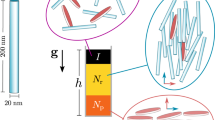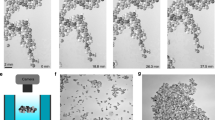Abstract
THE method described in this note provides a quick and efficient means for the fractionation of highly disperse systems—including the larger proteins—using relatively moderate centrifugal forces. Furthermore, all necessary information about the sedimentation rate and the sedimentation equilibria of these systems can be obtained, samples for examination being taken before and after spinning. Many important biological agents (viruses, bacteriophages, antibodies, etc.) remained outside the scope of the admirable methods developed by Svedberg because they are not susceptible to direct continuous optical observation, but they are within the range of the new procedure.
This is a preview of subscription content, access via your institution
Access options
Subscribe to this journal
Receive 51 print issues and online access
$199.00 per year
only $3.90 per issue
Buy this article
- Purchase on Springer Link
- Instant access to full article PDF
Prices may be subject to local taxes which are calculated during checkout
Similar content being viewed by others
References
W. J. Elford, P. Grabar and W. Fischer, Biochem. J., 30, 92 (1936).
J. Biscoe, F. Heriik and W. G. Wyckoff, Science, 83, 602 (1936).
M. Heidelberger, K. O. Pedersen and A. Tiselius, NATURE, 138, 165 (1936).
Author information
Authors and Affiliations
Rights and permissions
About this article
Cite this article
SCHLESINGER, M. Centrifuging in Rotating Hollow Cylinders. Nature 138, 549–550 (1936). https://doi.org/10.1038/138549a0
Issue Date:
DOI: https://doi.org/10.1038/138549a0
Comments
By submitting a comment you agree to abide by our Terms and Community Guidelines. If you find something abusive or that does not comply with our terms or guidelines please flag it as inappropriate.



